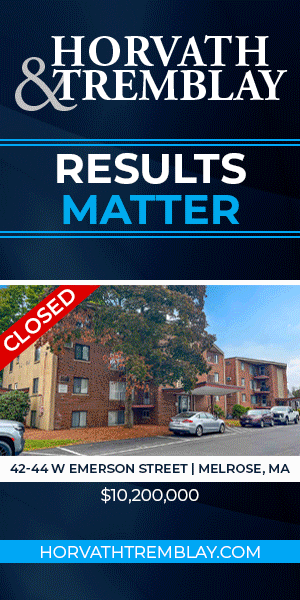Converting Office, “It’s Challenging”
December 01, 2023 — By Mike Hoban
BOSTON — With Downtown Boston office occupancy hovering around 20% and offices half-filled as the flexible work model becomes more deeply entrenched in the workplace, much of Boston’s older Class B and C stock appears doomed to become “zombie” buildings. This is not only bad news for owners of these properties but for the economic health of the City, as the loss of foot traffic in the CBD impacts local restaurants, retailers, and hospitality venues - and the loss of property tax and public transit revenue hurts the City’s and the MBTA’s ability to deliver services.
Converting these soon-to-be-obsolete buildings into much-needed residential properties (market-rate and affordable) would seem to be an ideal solution for a housing-strapped market like Boston, but there are significant barriers to converting office buildings into residential uses. ULI Boston/New England recently presented a forum on this strategy, assembling a panel of developers, architects, and City of Boston representatives for a program entitled “Evolving Downtown: Will Office to Residential Conversions Revive Boston’s Urban Center?”
Fittingly held at One Boston Place in the Financial District (constructed in 1970), the panel was moderated by Kendra Halliwell, Associate Principal, Practice + Design Team Leader at ICON Architecture. The panel included Reuben Kantor, Senior Advisor for Strategy and Operations, Boston Planning and Development Agency (BPDA); Jared Krieger, Co-Managing Director, Gensler; Mahmood Malihi, Co-President, Leggat McCall Properties, and David Greaney, Founder/CEO of Synergy Investments.
Downtown Boston Business Improvement District (BID) president Michael J. Nichols kicked off the proceedings by accentuating several positive trends for the BID, including thirty straight months of increased foot traffic, a 25% decrease in retail vacancy from a year ago, and an increase in the number of units of housing located in the Downtown to 6000, as density is a critical component of revitalization.
Conversion Feasibility
While the idea of converting office into residential sounds great in theory, the reality may be a far different story. An analysis conducted by HR&A Advisors for the City determined that “conversions only happen when the cost of conversion plus the existing office value is less than the future value of a residential building.” Gensler has developed a data-driven, algorithmic tool for determining the compatibility of a building for conversion and assessed over 1,000 buildings in North America. The scoring system consists of five weighted criteria: Site Context, 10% (walkability, transit, daylight and views); Building Form, 30% (shape of the building, how easy it is to plan units); Floor Plates, 30% (window to core distance, floorplate size, floor to floor height, and # of elevators); Building Envelope, 20% (sides with window, window to wall ratio, and ease of window replacement) and Servicing, 20% (loading, parking, structure, and MEP). The data revealed that only 25% of the 1,000 buildings scored were suitable candidates for conversion. More recently, Gensler conducted a study of 100 buildings in Boston and determined that approximately 30% of the buildings that they studied “warrant further consideration,” said Keiger, who added, “but that doesn’t mean (they’re) going to pencil.”
City of Boston Proposal to Assist Developers
The City of Boston, following the lead of cities like New York, Chicago, San Francisco, and DC, has introduced a program designed to help developers convert some office products into residential, the Downtown Residential Conversion Incentive Pilot Program. The BPDA’s Kantor emphasized that, with the program, the City is trying to be proactive in re-energizing the Downtown. “We’re not going to sit back and wait to see what’s going to happen. We wanted to take some action to make sure that we are offering lifelines to property owners downtown who might need them,” said the BPDA’s Kantor, who added that “we don’t pretend that this is a solution to the housing crisis, but we do believe it’s a tool that will chip away at it a little bit.” Here are the program highlights:
Key Elements
Selected developers will enter into a payment in lieu of taxes, or “PILOT” agreement with the City of Boston and the BPDA, providing an average abatement of up to 75% of fair market assessed residential value for up to 29 years. The PILOT agreement will require conversion of use from commercial to residential soon after signing the PILOT agreement.
There will be fast-tracked processes for both Article 80 and permitting.
Zoning for conversion to residential where applicable per PLAN: Downtown, with potential access to bonus density.
Requirements
- Owners must complete the application by June 2024 and start construction (i.e., have a full building permit) by October 2025.
- The target area is in the 121B Demonstration Project Area; however, projects will be considered on a case-by-case basis anywhere in the City
- Affordable Housing Requirement: PerBPDA-approved (pending ZoningCommission) Inclusionary ZoningStandards: 17% of all newly created units must be deed-restricted affordable for households making up to 60%of the Area Median Income, and another 3% of units must be available at fair Market Rent and reserved for voucher holders.
- Projects must comply with the City’s approved IDP requirements and the Commonwealth’s Stretch Energy Code.
- Program is for adaptive reuse projectsonly – not tear-down and new ground-up construction
- If a building that does not meet the requirements and qualifications listed above could be converted, the BPDAwill consider all applications for eligibility in meeting the City’s goals in this program.
In addition to the City of Boston program, Kantor said additional tools and incentives from the state and federal governments can assist developers seeking to convert office to residential, offering low-interest loans, loan guarantees, grants, and tax incentives, which, subject to the requirements of each program, may be used together to increase the economic viability of conversion projects.
Developers Not Optimistic
Despite the program incentives, developers are not overly enthusiastic about the viability of conversions in Downtown Boston. Malihi cited the problems with adapting existing building forms to residential as opposed to the inherent efficiency of doing ground-up construction. “Unfortunately, this is happening at a time when rates are high, and the cost of IDP (Inclusionary Development Policy, which mandates 20% affordable units in projects with more than 10 units) is (also a factor), and this is a low-margin business,” said Malihi. “So my instinct is that projects will happen under this program, but I think it will be slow, and the ones that do happen will have minimal intervention.”
Greaney praised the City’s efforts as a “good start” and conversions, from a public policy perspective, “make a lot of sense” given the success that other cities have had with adapting office to residential, but he is concerned that much remains to be done to make conversion projects in Boston a reality.
“The idea that you can take a building that is 70% or 80% occupied, empty out all of your tenants, work something out with your bank if you have debt, and get to that empty building – what is that basis?” he asked. “I think there has to be a reset of basis if you’re going to convert from office to residential – possibly with a new owner. But if you start there and you look at the numbers, it’s challenging. It doesn’t pencil out, and I think without significant state or federal help, the city tax program and how it’s laid out is just not enough.”
ULI Boston/New England Manager Tim Moore conveyed his takeaways after the event. “Without a solid municipal plan to assist with the financing, I think it’s going to be difficult for developers to make projects pencil on their own,” said Moore. “I think municipalities can put together toolkits that will assist in making these projects pencil, but the biggest challenges will be regulation and cost.” n
 Downtown Boston Proposed Conversion Area
Downtown Boston Proposed Conversion Area






